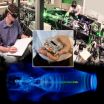(Press-News.org) Some consumers will pay more for a product if they are given detailed information on how it works while others are inclined to pay less when given too much detail, according to a new study in the Journal of Consumer Research.
"Certain consumers like to understand how a product works and are willing to pay more when given this information. But others do not want deep explanations and are satisfied by sketchy, abstract knowledge. Asking them to explain how a product works undermines their sense of understanding and makes them less willing to pay for it," write authors Philip M. Fernbach (University of Colorado), Steven A. Sloman, Robert St. Louis, and Julia N. Shube (all Brown University).
Consumers suffer from an illusion that they understand how everyday objects work. For instance, most people will report that they have quite sophisticated knowledge about how a toilet works. However, if they are then asked to explain the mechanisms they will be unable to and their feeling of understanding will disappear.
In a series of interesting experiments, the authors discovered that consumers differ in their susceptibility to this illusion and this may be why they also differ in whether they like shallow or detailed explanations. Those who tend to question their intuition are more likely to realize that their initial sense of understanding is not based on true knowledge and thus desire additional explanation, which gives them a deeper understanding. In contrast, additional details will only serve to expose this illusion to consumers who feel like they understand even when their knowledge is quite coarse and simplistic. This leaves them feeling like they do not understand, and therefore less certain about a product's effectiveness.
"Consumers vary in the strength of their intuitions and in their willingness to deliberate. They will be more receptive to messages that speak to their natural modes of thought. Some are more likely to be attracted by careful arguments while others will be attracted by aesthetically and intuitively appealing communications and coarse explanations," the authors conclude.
###Philip M. Fernbach, Steven A. Sloman, Robert St. Louis, and Julia N. Shube. "Explanation Fiends and Foes: How Mechanistic Detail Determines Understanding and Preference." Journal of Consumer Research: February 2013. For more information, contact Philip Fernbach (philip.fernbach@colorado.edu) or visit http://ejcr.org/.
It's all in the details: Why are some consumers willing to pay more for less information?
2012-10-22
ELSE PRESS RELEASES FROM THIS DATE:
In the blink of an eye: Distracted consumers are most likely to remember ads with subtle variations
2012-10-22
Consumers are more likely to remember an ad they've seen repeatedly if one element in the ad changes location from one exposure to the next, according to a new study in the Journal of Consumer Research.
"Consumers are bombarded with thousands of advertisements daily, are increasingly multitasking, and are preoccupied with everyday activities. The likelihood that they will devote their full attention to any one specific message is getting smaller every day. What impact can an ad have if consumers pay virtually no attention to it?" write authors Stewart Shapiro (University ...
Split-personality elliptical galaxy holds a hidden spiral
2012-10-22
Most big galaxies fit into one of two camps: pinwheel-shaped spiral galaxies and blobby elliptical galaxies. Spirals like the Milky Way are hip and happening places, with plenty of gas and dust to birth new stars. Ellipticals are like cosmic retirement villages, full of aging residents in the form of red giant stars. Now, astronomers have discovered that one well-known elliptical has a split personality. Centaurus A is hiding a gassy spiral in its center.
"No other elliptical galaxy is known to have spiral arms," said lead author Daniel Espada (National Astronomical Observatory ...
High quality or poor value: When do consumers make different conclusions about the same product?
2012-10-22
Depending on which naive theory consumers use, a low price can indicate either good value or low quality, whereas a high price may imply either poor value or high quality, according to a new study in the Journal of Consumer Research.
"Consumers rarely have complete information and use various strategies to fill the gaps in their knowledge as they consider and choose products. One of these strategies involves using naive theories: informal, common sense, explanations that consumers use to make sense of their environment. For example, consumers may believe that popular ...
Rewards programs: When do consumers compare experience over value?
2012-10-22
Consumers are often less satisfied when they buy or receive products that are easily counted because this makes them focus on value instead of experience, according to a new study in the Journal of Consumer Research.
"Numbers make us feel more certain of what is in front of us. When we count, we understand exactly how big, expensive, heavy, or old something is. But when we buy or receive products that are easily counted, we may be less satisfied," write authors Jingjing Ma and Neal J. Roese (both Kellogg School of Management, Northwestern University).
What happens when ...
Greater parental stress linked to children's obesity, fast food use and reduced physical activity
2012-10-22
Parents with a higher number of stressors in their lives are more likely to have obese children, according to a new study by pediatric researchers. Furthermore, when parents perceive themselves to be stressed, their children eat fast food more often, compared to children whose parents feel less stressed.
"Stress in parents may be an important risk factor for child obesity and related behaviors," said Elizabeth Prout-Parks, M.D., a physician nutrition specialist at The Children's Hospital of Philadelphia, who led a study published online today in the November issue of ...
Friendship 2.0: Teens' technology use promotes sense of belonging, identity
2012-10-22
With adolescents seemingly glued to cell phones and social networking websites, experts are investigating whether the near-constant digital activity changes youths' development.
A new study from the University of Washington shows that digital media helps teens reach developmental milestones, such as fostering a sense of belonging and sharing personal problems. But the study also raised questions about whether digital connectedness might hinder the development of an autonomous sense of self.
Katie Davis, an assistant professor in the Information School and an expert ...
Breast cancer cells enticed to spread by 'tumorous environment' as well as genetic changes
2012-10-22
A new study from Johns Hopkins researchers suggests that the lethal spread of breast cancer is as dependent on a tumor's protein-rich environment as on genetic changes inside tumor cells.
In a report in the Sept. 25 issue of the Proceedings of the National Academy of Sciences, the scientists conclude that a molecular signal in the protein meshwork surrounding the breast cancer cells may provide the critical trigger to initiate the life-threatening process of metastasis to distant sites in the body.
Moreover, their experiments suggest that the environment surrounding ...
Clue to cause of Alzheimer's dementia found in brain samples
2012-10-22
Researchers at Washington University School of Medicine in St. Louis have found a key difference in the brains of people with Alzheimer's disease and those who are cognitively normal but still have brain plaques that characterize this type of dementia.
"There is a very interesting group of people whose thinking and memory are normal, even late in life, yet their brains are full of amyloid beta plaques that appear to be identical to what's seen in Alzheimer's disease," says David L. Brody, MD, PhD, associate professor of neurology. "How this can occur is a tantalizing ...
State-of-the-art beams from table-top accelerators
2012-10-22
Focusing in on beam focus
The rapidly evolving technology of laser plasma accelerators (LPAs) – called "table-top accelerators" because their length can be measured in centimeters instead of kilometers – promises a new breed of machines, far less expensive and with far less impact on the land and the environment than today's conventional accelerators.
Future LPAs offer not only compact high-energy colliders for fundamental physics but diminutive light sources as well. These will probe chemical reactions, from artificial photosynthesis to "green catalysis"; unique biological ...
Scattered X-rays reveal diseased tissue
2012-10-22
This press release is available in German.
Chronic obstructive pulmonary disease (COPD) is considered the fourth most common cause of death in the United States. Usually the precursor to this life-threatening lung disease is a chronic bronchitis. Partially destroyed alveoli and an over-inflation of the lungs, known as emphysema, are serious side effects. However, the subtle differences in the tissue are barely discernable in standard X-ray images.
In addition to the conventional X-ray images, the Munich scientists analyzed the radiation scattered by the tissue. ...


